Report on Entrepreneurship and Small Business Management-Desklib
VerifiedAdded on 2023/01/17
|17
|3962
|51
Report
AI Summary
This report provides a comprehensive overview of entrepreneurship and small business management, covering various forms of entrepreneurial ventures and their relationship to different typologies of entrepreneurship. It examines the differences and similarities among these ventures, including large, small, social, and scalable enterprises, and assesses their impact on the economy using data and statistics. The report also highlights the importance of startups and small businesses in the development of the social economy, focusing on aspects such as employment generation, raising living standards, and fostering innovation. Furthermore, it discusses the characteristic traits and skills of successful entrepreneurs, differentiating them from business managers, and explores how background and experience can either hinder or foster entrepreneurship. The study references real-world examples like Apple, Amazon, and Facebook to illustrate key concepts and economic impacts.

Entrepreneurship
and Small Business
Management
and Small Business
Management
Paraphrase This Document
Need a fresh take? Get an instant paraphrase of this document with our AI Paraphraser
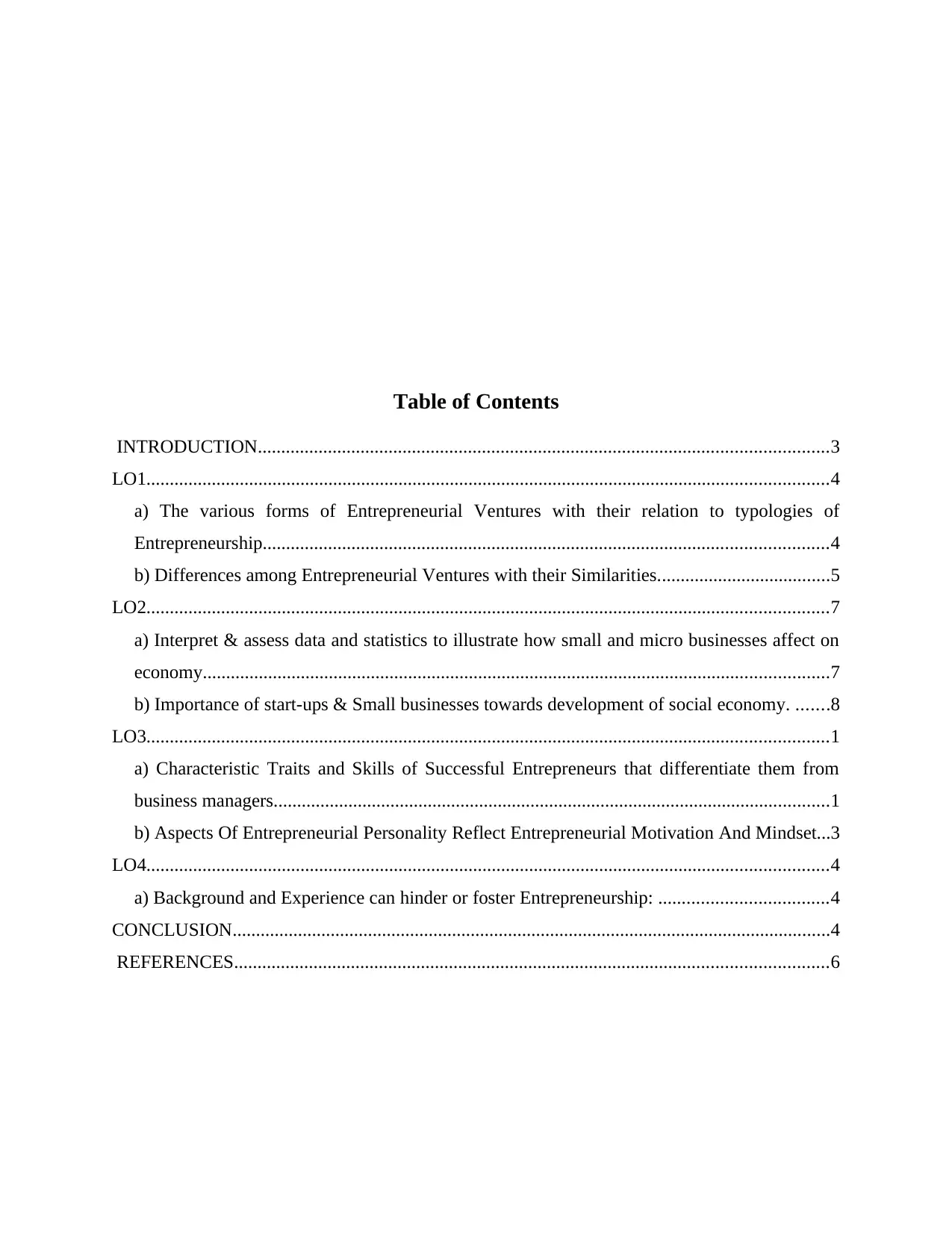
Table of Contents
INTRODUCTION..........................................................................................................................3
LO1..................................................................................................................................................4
a) The various forms of Entrepreneurial Ventures with their relation to typologies of
Entrepreneurship.........................................................................................................................4
b) Differences among Entrepreneurial Ventures with their Similarities.....................................5
LO2..................................................................................................................................................7
a) Interpret & assess data and statistics to illustrate how small and micro businesses affect on
economy......................................................................................................................................7
b) Importance of start-ups & Small businesses towards development of social economy. .......8
LO3..................................................................................................................................................1
a) Characteristic Traits and Skills of Successful Entrepreneurs that differentiate them from
business managers.......................................................................................................................1
b) Aspects Of Entrepreneurial Personality Reflect Entrepreneurial Motivation And Mindset...3
LO4..................................................................................................................................................4
a) Background and Experience can hinder or foster Entrepreneurship: ....................................4
CONCLUSION................................................................................................................................4
REFERENCES...............................................................................................................................6
INTRODUCTION..........................................................................................................................3
LO1..................................................................................................................................................4
a) The various forms of Entrepreneurial Ventures with their relation to typologies of
Entrepreneurship.........................................................................................................................4
b) Differences among Entrepreneurial Ventures with their Similarities.....................................5
LO2..................................................................................................................................................7
a) Interpret & assess data and statistics to illustrate how small and micro businesses affect on
economy......................................................................................................................................7
b) Importance of start-ups & Small businesses towards development of social economy. .......8
LO3..................................................................................................................................................1
a) Characteristic Traits and Skills of Successful Entrepreneurs that differentiate them from
business managers.......................................................................................................................1
b) Aspects Of Entrepreneurial Personality Reflect Entrepreneurial Motivation And Mindset...3
LO4..................................................................................................................................................4
a) Background and Experience can hinder or foster Entrepreneurship: ....................................4
CONCLUSION................................................................................................................................4
REFERENCES...............................................................................................................................6
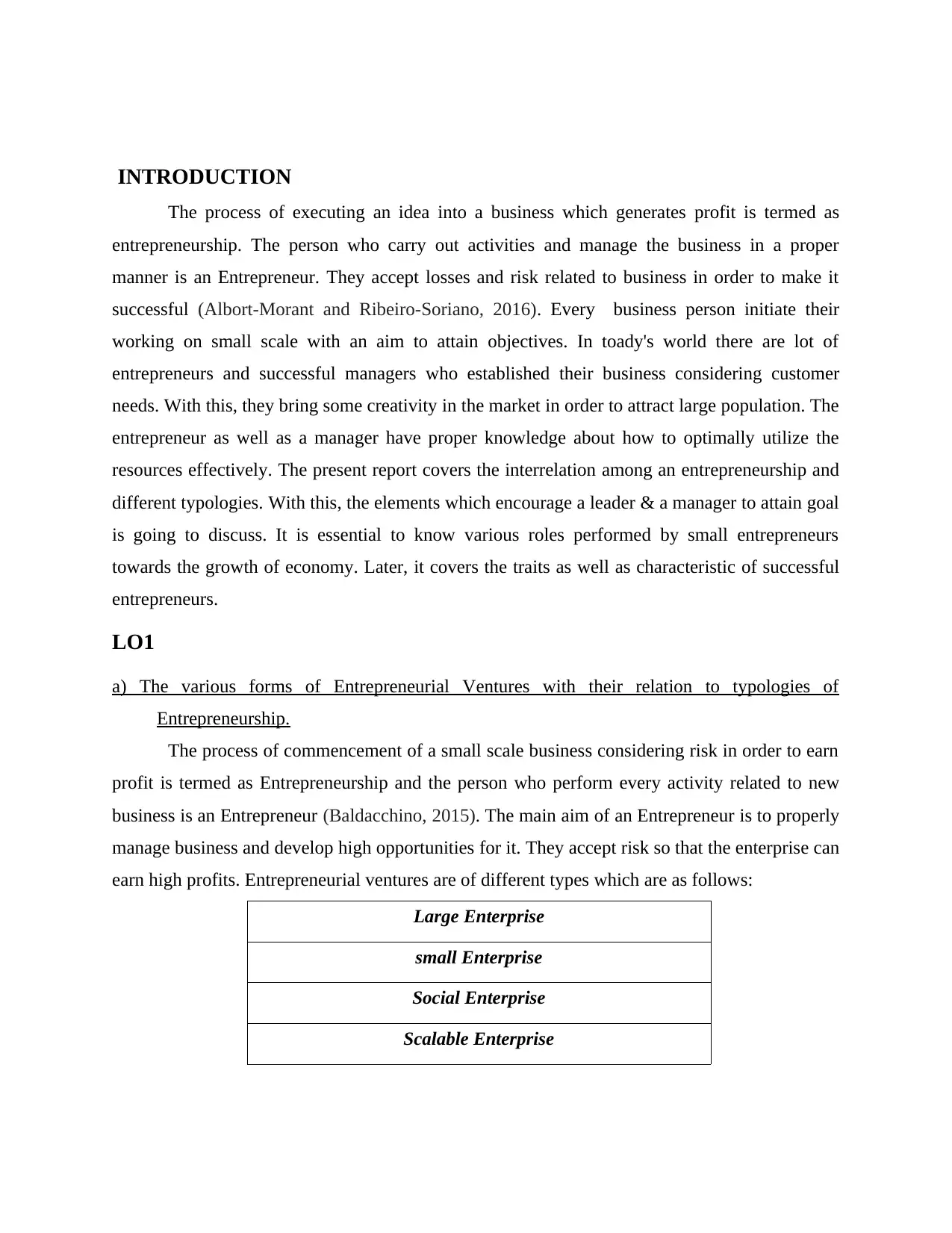
INTRODUCTION
The process of executing an idea into a business which generates profit is termed as
entrepreneurship. The person who carry out activities and manage the business in a proper
manner is an Entrepreneur. They accept losses and risk related to business in order to make it
successful (Albort-Morant and Ribeiro-Soriano, 2016). Every business person initiate their
working on small scale with an aim to attain objectives. In toady's world there are lot of
entrepreneurs and successful managers who established their business considering customer
needs. With this, they bring some creativity in the market in order to attract large population. The
entrepreneur as well as a manager have proper knowledge about how to optimally utilize the
resources effectively. The present report covers the interrelation among an entrepreneurship and
different typologies. With this, the elements which encourage a leader & a manager to attain goal
is going to discuss. It is essential to know various roles performed by small entrepreneurs
towards the growth of economy. Later, it covers the traits as well as characteristic of successful
entrepreneurs.
LO1
a) The various forms of Entrepreneurial Ventures with their relation to typologies of
Entrepreneurship.
The process of commencement of a small scale business considering risk in order to earn
profit is termed as Entrepreneurship and the person who perform every activity related to new
business is an Entrepreneur (Baldacchino, 2015). The main aim of an Entrepreneur is to properly
manage business and develop high opportunities for it. They accept risk so that the enterprise can
earn high profits. Entrepreneurial ventures are of different types which are as follows:
Large Enterprise
small Enterprise
Social Enterprise
Scalable Enterprise
The process of executing an idea into a business which generates profit is termed as
entrepreneurship. The person who carry out activities and manage the business in a proper
manner is an Entrepreneur. They accept losses and risk related to business in order to make it
successful (Albort-Morant and Ribeiro-Soriano, 2016). Every business person initiate their
working on small scale with an aim to attain objectives. In toady's world there are lot of
entrepreneurs and successful managers who established their business considering customer
needs. With this, they bring some creativity in the market in order to attract large population. The
entrepreneur as well as a manager have proper knowledge about how to optimally utilize the
resources effectively. The present report covers the interrelation among an entrepreneurship and
different typologies. With this, the elements which encourage a leader & a manager to attain goal
is going to discuss. It is essential to know various roles performed by small entrepreneurs
towards the growth of economy. Later, it covers the traits as well as characteristic of successful
entrepreneurs.
LO1
a) The various forms of Entrepreneurial Ventures with their relation to typologies of
Entrepreneurship.
The process of commencement of a small scale business considering risk in order to earn
profit is termed as Entrepreneurship and the person who perform every activity related to new
business is an Entrepreneur (Baldacchino, 2015). The main aim of an Entrepreneur is to properly
manage business and develop high opportunities for it. They accept risk so that the enterprise can
earn high profits. Entrepreneurial ventures are of different types which are as follows:
Large Enterprise
small Enterprise
Social Enterprise
Scalable Enterprise
⊘ This is a preview!⊘
Do you want full access?
Subscribe today to unlock all pages.

Trusted by 1+ million students worldwide
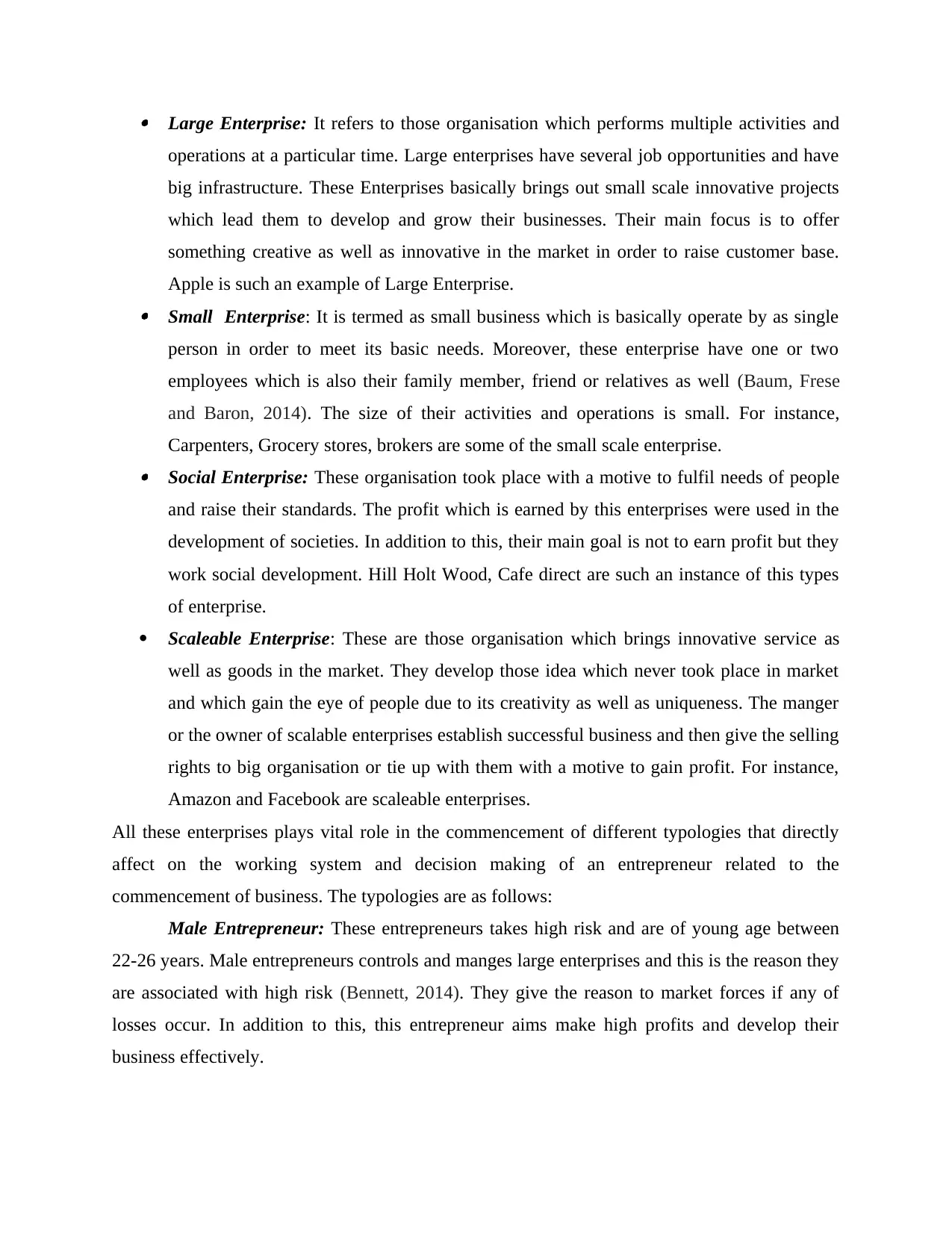
Large Enterprise: It refers to those organisation which performs multiple activities and
operations at a particular time. Large enterprises have several job opportunities and have
big infrastructure. These Enterprises basically brings out small scale innovative projects
which lead them to develop and grow their businesses. Their main focus is to offer
something creative as well as innovative in the market in order to raise customer base.
Apple is such an example of Large Enterprise. Small Enterprise: It is termed as small business which is basically operate by as single
person in order to meet its basic needs. Moreover, these enterprise have one or two
employees which is also their family member, friend or relatives as well (Baum, Frese
and Baron, 2014). The size of their activities and operations is small. For instance,
Carpenters, Grocery stores, brokers are some of the small scale enterprise. Social Enterprise: These organisation took place with a motive to fulfil needs of people
and raise their standards. The profit which is earned by this enterprises were used in the
development of societies. In addition to this, their main goal is not to earn profit but they
work social development. Hill Holt Wood, Cafe direct are such an instance of this types
of enterprise.
Scaleable Enterprise: These are those organisation which brings innovative service as
well as goods in the market. They develop those idea which never took place in market
and which gain the eye of people due to its creativity as well as uniqueness. The manger
or the owner of scalable enterprises establish successful business and then give the selling
rights to big organisation or tie up with them with a motive to gain profit. For instance,
Amazon and Facebook are scaleable enterprises.
All these enterprises plays vital role in the commencement of different typologies that directly
affect on the working system and decision making of an entrepreneur related to the
commencement of business. The typologies are as follows:
Male Entrepreneur: These entrepreneurs takes high risk and are of young age between
22-26 years. Male entrepreneurs controls and manges large enterprises and this is the reason they
are associated with high risk (Bennett, 2014). They give the reason to market forces if any of
losses occur. In addition to this, this entrepreneur aims make high profits and develop their
business effectively.
operations at a particular time. Large enterprises have several job opportunities and have
big infrastructure. These Enterprises basically brings out small scale innovative projects
which lead them to develop and grow their businesses. Their main focus is to offer
something creative as well as innovative in the market in order to raise customer base.
Apple is such an example of Large Enterprise. Small Enterprise: It is termed as small business which is basically operate by as single
person in order to meet its basic needs. Moreover, these enterprise have one or two
employees which is also their family member, friend or relatives as well (Baum, Frese
and Baron, 2014). The size of their activities and operations is small. For instance,
Carpenters, Grocery stores, brokers are some of the small scale enterprise. Social Enterprise: These organisation took place with a motive to fulfil needs of people
and raise their standards. The profit which is earned by this enterprises were used in the
development of societies. In addition to this, their main goal is not to earn profit but they
work social development. Hill Holt Wood, Cafe direct are such an instance of this types
of enterprise.
Scaleable Enterprise: These are those organisation which brings innovative service as
well as goods in the market. They develop those idea which never took place in market
and which gain the eye of people due to its creativity as well as uniqueness. The manger
or the owner of scalable enterprises establish successful business and then give the selling
rights to big organisation or tie up with them with a motive to gain profit. For instance,
Amazon and Facebook are scaleable enterprises.
All these enterprises plays vital role in the commencement of different typologies that directly
affect on the working system and decision making of an entrepreneur related to the
commencement of business. The typologies are as follows:
Male Entrepreneur: These entrepreneurs takes high risk and are of young age between
22-26 years. Male entrepreneurs controls and manges large enterprises and this is the reason they
are associated with high risk (Bennett, 2014). They give the reason to market forces if any of
losses occur. In addition to this, this entrepreneur aims make high profits and develop their
business effectively.
Paraphrase This Document
Need a fresh take? Get an instant paraphrase of this document with our AI Paraphraser
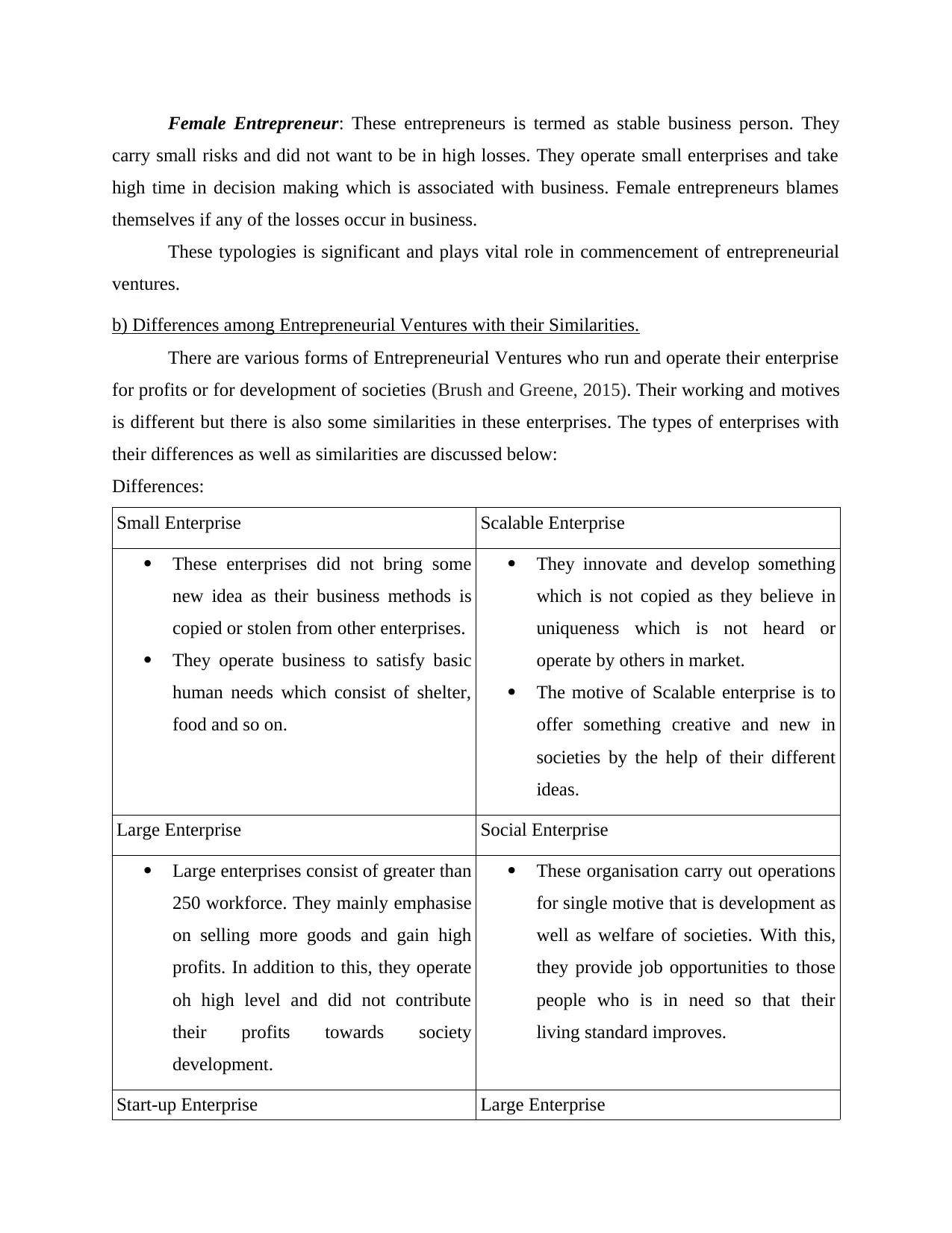
Female Entrepreneur: These entrepreneurs is termed as stable business person. They
carry small risks and did not want to be in high losses. They operate small enterprises and take
high time in decision making which is associated with business. Female entrepreneurs blames
themselves if any of the losses occur in business.
These typologies is significant and plays vital role in commencement of entrepreneurial
ventures.
b) Differences among Entrepreneurial Ventures with their Similarities.
There are various forms of Entrepreneurial Ventures who run and operate their enterprise
for profits or for development of societies (Brush and Greene, 2015). Their working and motives
is different but there is also some similarities in these enterprises. The types of enterprises with
their differences as well as similarities are discussed below:
Differences:
Small Enterprise Scalable Enterprise
These enterprises did not bring some
new idea as their business methods is
copied or stolen from other enterprises.
They operate business to satisfy basic
human needs which consist of shelter,
food and so on.
They innovate and develop something
which is not copied as they believe in
uniqueness which is not heard or
operate by others in market.
The motive of Scalable enterprise is to
offer something creative and new in
societies by the help of their different
ideas.
Large Enterprise Social Enterprise
Large enterprises consist of greater than
250 workforce. They mainly emphasise
on selling more goods and gain high
profits. In addition to this, they operate
oh high level and did not contribute
their profits towards society
development.
These organisation carry out operations
for single motive that is development as
well as welfare of societies. With this,
they provide job opportunities to those
people who is in need so that their
living standard improves.
Start-up Enterprise Large Enterprise
carry small risks and did not want to be in high losses. They operate small enterprises and take
high time in decision making which is associated with business. Female entrepreneurs blames
themselves if any of the losses occur in business.
These typologies is significant and plays vital role in commencement of entrepreneurial
ventures.
b) Differences among Entrepreneurial Ventures with their Similarities.
There are various forms of Entrepreneurial Ventures who run and operate their enterprise
for profits or for development of societies (Brush and Greene, 2015). Their working and motives
is different but there is also some similarities in these enterprises. The types of enterprises with
their differences as well as similarities are discussed below:
Differences:
Small Enterprise Scalable Enterprise
These enterprises did not bring some
new idea as their business methods is
copied or stolen from other enterprises.
They operate business to satisfy basic
human needs which consist of shelter,
food and so on.
They innovate and develop something
which is not copied as they believe in
uniqueness which is not heard or
operate by others in market.
The motive of Scalable enterprise is to
offer something creative and new in
societies by the help of their different
ideas.
Large Enterprise Social Enterprise
Large enterprises consist of greater than
250 workforce. They mainly emphasise
on selling more goods and gain high
profits. In addition to this, they operate
oh high level and did not contribute
their profits towards society
development.
These organisation carry out operations
for single motive that is development as
well as welfare of societies. With this,
they provide job opportunities to those
people who is in need so that their
living standard improves.
Start-up Enterprise Large Enterprise
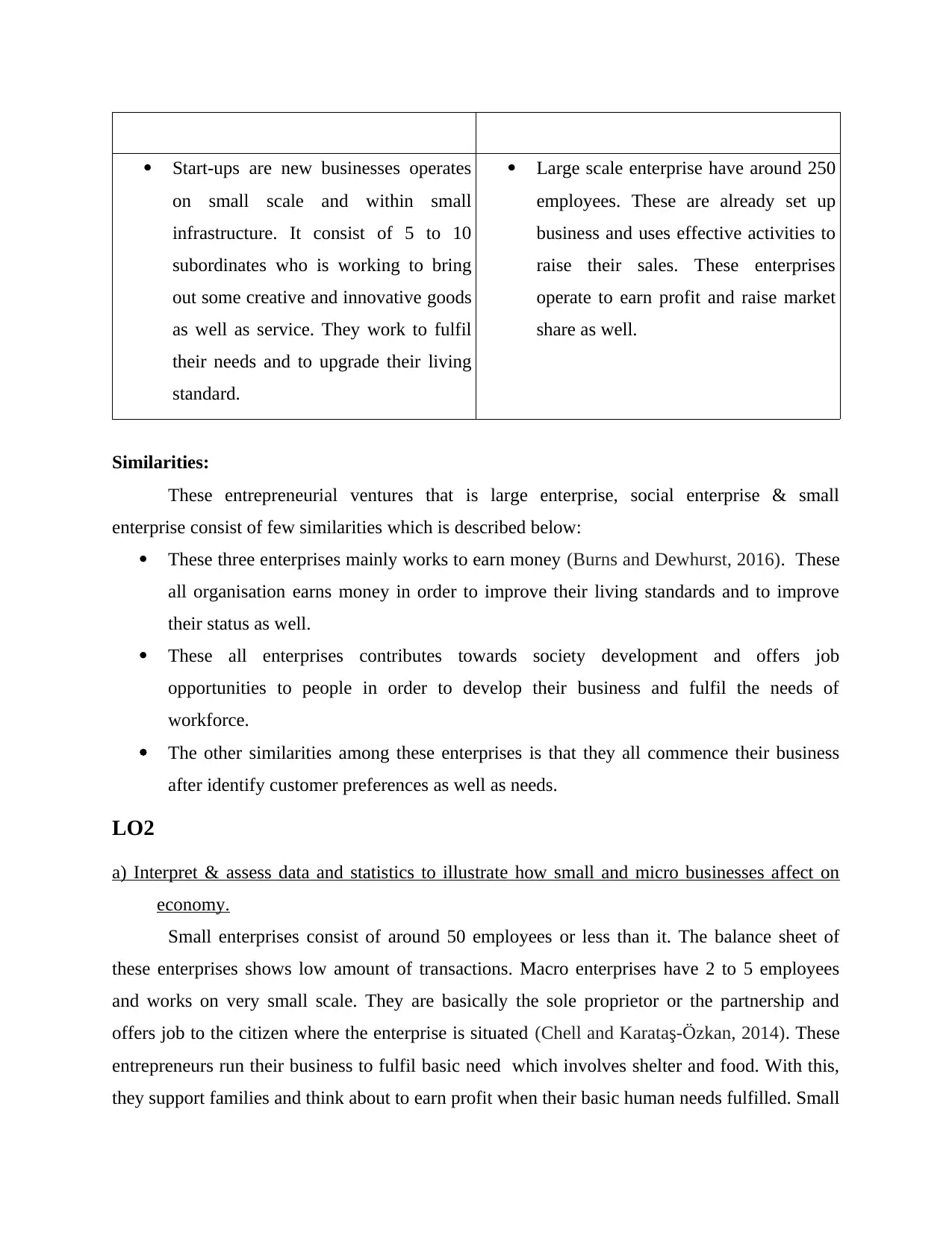
Start-ups are new businesses operates
on small scale and within small
infrastructure. It consist of 5 to 10
subordinates who is working to bring
out some creative and innovative goods
as well as service. They work to fulfil
their needs and to upgrade their living
standard.
Large scale enterprise have around 250
employees. These are already set up
business and uses effective activities to
raise their sales. These enterprises
operate to earn profit and raise market
share as well.
Similarities:
These entrepreneurial ventures that is large enterprise, social enterprise & small
enterprise consist of few similarities which is described below:
These three enterprises mainly works to earn money (Burns and Dewhurst, 2016). These
all organisation earns money in order to improve their living standards and to improve
their status as well.
These all enterprises contributes towards society development and offers job
opportunities to people in order to develop their business and fulfil the needs of
workforce.
The other similarities among these enterprises is that they all commence their business
after identify customer preferences as well as needs.
LO2
a) Interpret & assess data and statistics to illustrate how small and micro businesses affect on
economy.
Small enterprises consist of around 50 employees or less than it. The balance sheet of
these enterprises shows low amount of transactions. Macro enterprises have 2 to 5 employees
and works on very small scale. They are basically the sole proprietor or the partnership and
offers job to the citizen where the enterprise is situated (Chell and Karataş-Özkan, 2014). These
entrepreneurs run their business to fulfil basic need which involves shelter and food. With this,
they support families and think about to earn profit when their basic human needs fulfilled. Small
on small scale and within small
infrastructure. It consist of 5 to 10
subordinates who is working to bring
out some creative and innovative goods
as well as service. They work to fulfil
their needs and to upgrade their living
standard.
Large scale enterprise have around 250
employees. These are already set up
business and uses effective activities to
raise their sales. These enterprises
operate to earn profit and raise market
share as well.
Similarities:
These entrepreneurial ventures that is large enterprise, social enterprise & small
enterprise consist of few similarities which is described below:
These three enterprises mainly works to earn money (Burns and Dewhurst, 2016). These
all organisation earns money in order to improve their living standards and to improve
their status as well.
These all enterprises contributes towards society development and offers job
opportunities to people in order to develop their business and fulfil the needs of
workforce.
The other similarities among these enterprises is that they all commence their business
after identify customer preferences as well as needs.
LO2
a) Interpret & assess data and statistics to illustrate how small and micro businesses affect on
economy.
Small enterprises consist of around 50 employees or less than it. The balance sheet of
these enterprises shows low amount of transactions. Macro enterprises have 2 to 5 employees
and works on very small scale. They are basically the sole proprietor or the partnership and
offers job to the citizen where the enterprise is situated (Chell and Karataş-Özkan, 2014). These
entrepreneurs run their business to fulfil basic need which involves shelter and food. With this,
they support families and think about to earn profit when their basic human needs fulfilled. Small
⊘ This is a preview!⊘
Do you want full access?
Subscribe today to unlock all pages.

Trusted by 1+ million students worldwide
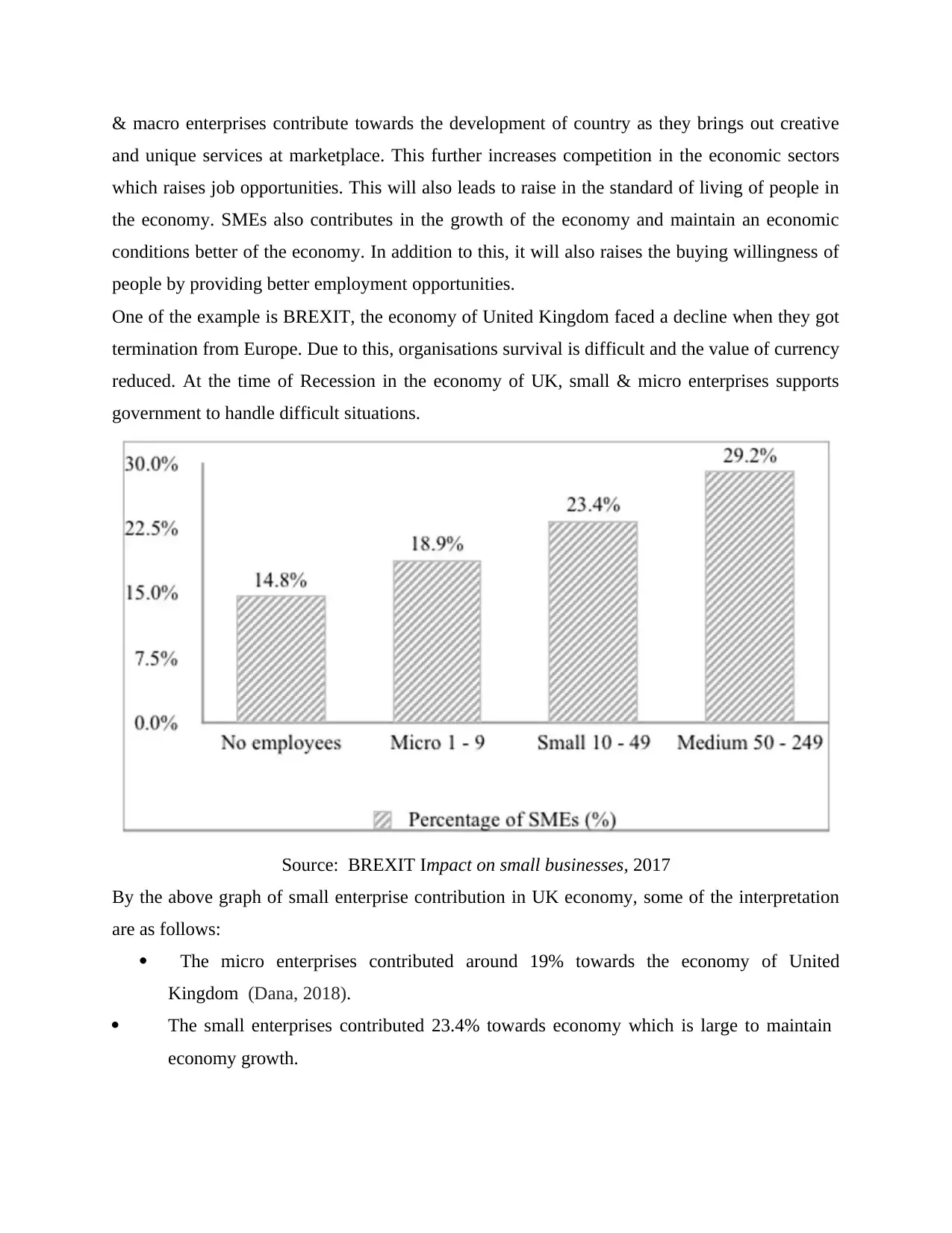
& macro enterprises contribute towards the development of country as they brings out creative
and unique services at marketplace. This further increases competition in the economic sectors
which raises job opportunities. This will also leads to raise in the standard of living of people in
the economy. SMEs also contributes in the growth of the economy and maintain an economic
conditions better of the economy. In addition to this, it will also raises the buying willingness of
people by providing better employment opportunities.
One of the example is BREXIT, the economy of United Kingdom faced a decline when they got
termination from Europe. Due to this, organisations survival is difficult and the value of currency
reduced. At the time of Recession in the economy of UK, small & micro enterprises supports
government to handle difficult situations.
Source: BREXIT Impact on small businesses, 2017
By the above graph of small enterprise contribution in UK economy, some of the interpretation
are as follows:
The micro enterprises contributed around 19% towards the economy of United
Kingdom (Dana, 2018).
The small enterprises contributed 23.4% towards economy which is large to maintain
economy growth.
and unique services at marketplace. This further increases competition in the economic sectors
which raises job opportunities. This will also leads to raise in the standard of living of people in
the economy. SMEs also contributes in the growth of the economy and maintain an economic
conditions better of the economy. In addition to this, it will also raises the buying willingness of
people by providing better employment opportunities.
One of the example is BREXIT, the economy of United Kingdom faced a decline when they got
termination from Europe. Due to this, organisations survival is difficult and the value of currency
reduced. At the time of Recession in the economy of UK, small & micro enterprises supports
government to handle difficult situations.
Source: BREXIT Impact on small businesses, 2017
By the above graph of small enterprise contribution in UK economy, some of the interpretation
are as follows:
The micro enterprises contributed around 19% towards the economy of United
Kingdom (Dana, 2018).
The small enterprises contributed 23.4% towards economy which is large to maintain
economy growth.
Paraphrase This Document
Need a fresh take? Get an instant paraphrase of this document with our AI Paraphraser
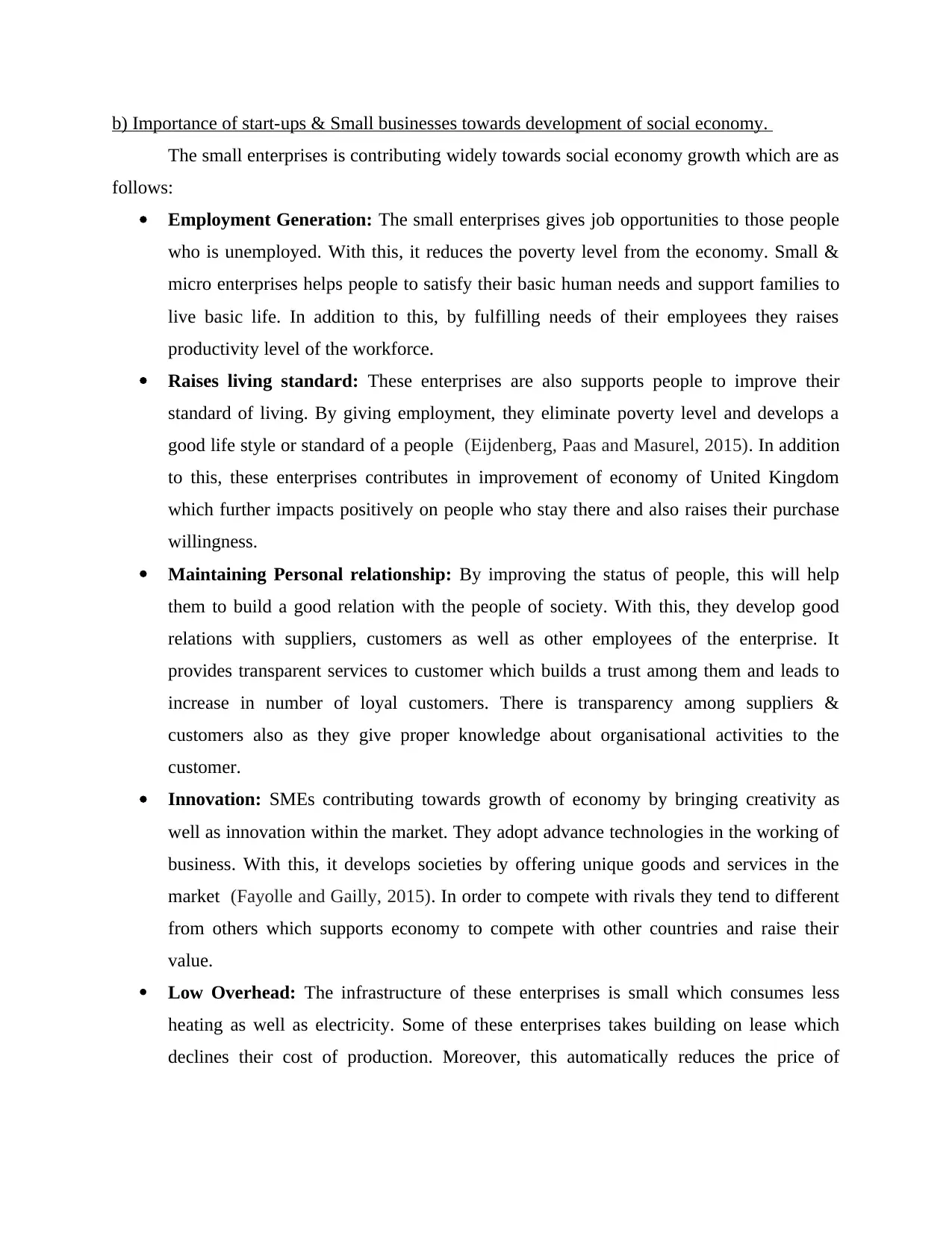
b) Importance of start-ups & Small businesses towards development of social economy.
The small enterprises is contributing widely towards social economy growth which are as
follows:
Employment Generation: The small enterprises gives job opportunities to those people
who is unemployed. With this, it reduces the poverty level from the economy. Small &
micro enterprises helps people to satisfy their basic human needs and support families to
live basic life. In addition to this, by fulfilling needs of their employees they raises
productivity level of the workforce.
Raises living standard: These enterprises are also supports people to improve their
standard of living. By giving employment, they eliminate poverty level and develops a
good life style or standard of a people (Eijdenberg, Paas and Masurel, 2015). In addition
to this, these enterprises contributes in improvement of economy of United Kingdom
which further impacts positively on people who stay there and also raises their purchase
willingness.
Maintaining Personal relationship: By improving the status of people, this will help
them to build a good relation with the people of society. With this, they develop good
relations with suppliers, customers as well as other employees of the enterprise. It
provides transparent services to customer which builds a trust among them and leads to
increase in number of loyal customers. There is transparency among suppliers &
customers also as they give proper knowledge about organisational activities to the
customer.
Innovation: SMEs contributing towards growth of economy by bringing creativity as
well as innovation within the market. They adopt advance technologies in the working of
business. With this, it develops societies by offering unique goods and services in the
market (Fayolle and Gailly, 2015). In order to compete with rivals they tend to different
from others which supports economy to compete with other countries and raise their
value.
Low Overhead: The infrastructure of these enterprises is small which consumes less
heating as well as electricity. Some of these enterprises takes building on lease which
declines their cost of production. Moreover, this automatically reduces the price of
The small enterprises is contributing widely towards social economy growth which are as
follows:
Employment Generation: The small enterprises gives job opportunities to those people
who is unemployed. With this, it reduces the poverty level from the economy. Small &
micro enterprises helps people to satisfy their basic human needs and support families to
live basic life. In addition to this, by fulfilling needs of their employees they raises
productivity level of the workforce.
Raises living standard: These enterprises are also supports people to improve their
standard of living. By giving employment, they eliminate poverty level and develops a
good life style or standard of a people (Eijdenberg, Paas and Masurel, 2015). In addition
to this, these enterprises contributes in improvement of economy of United Kingdom
which further impacts positively on people who stay there and also raises their purchase
willingness.
Maintaining Personal relationship: By improving the status of people, this will help
them to build a good relation with the people of society. With this, they develop good
relations with suppliers, customers as well as other employees of the enterprise. It
provides transparent services to customer which builds a trust among them and leads to
increase in number of loyal customers. There is transparency among suppliers &
customers also as they give proper knowledge about organisational activities to the
customer.
Innovation: SMEs contributing towards growth of economy by bringing creativity as
well as innovation within the market. They adopt advance technologies in the working of
business. With this, it develops societies by offering unique goods and services in the
market (Fayolle and Gailly, 2015). In order to compete with rivals they tend to different
from others which supports economy to compete with other countries and raise their
value.
Low Overhead: The infrastructure of these enterprises is small which consumes less
heating as well as electricity. Some of these enterprises takes building on lease which
declines their cost of production. Moreover, this automatically reduces the price of

products which it offers in the market. The customers get attracted towards low price
goods which help them to buy more and live their life easily.
goods which help them to buy more and live their life easily.
⊘ This is a preview!⊘
Do you want full access?
Subscribe today to unlock all pages.

Trusted by 1+ million students worldwide
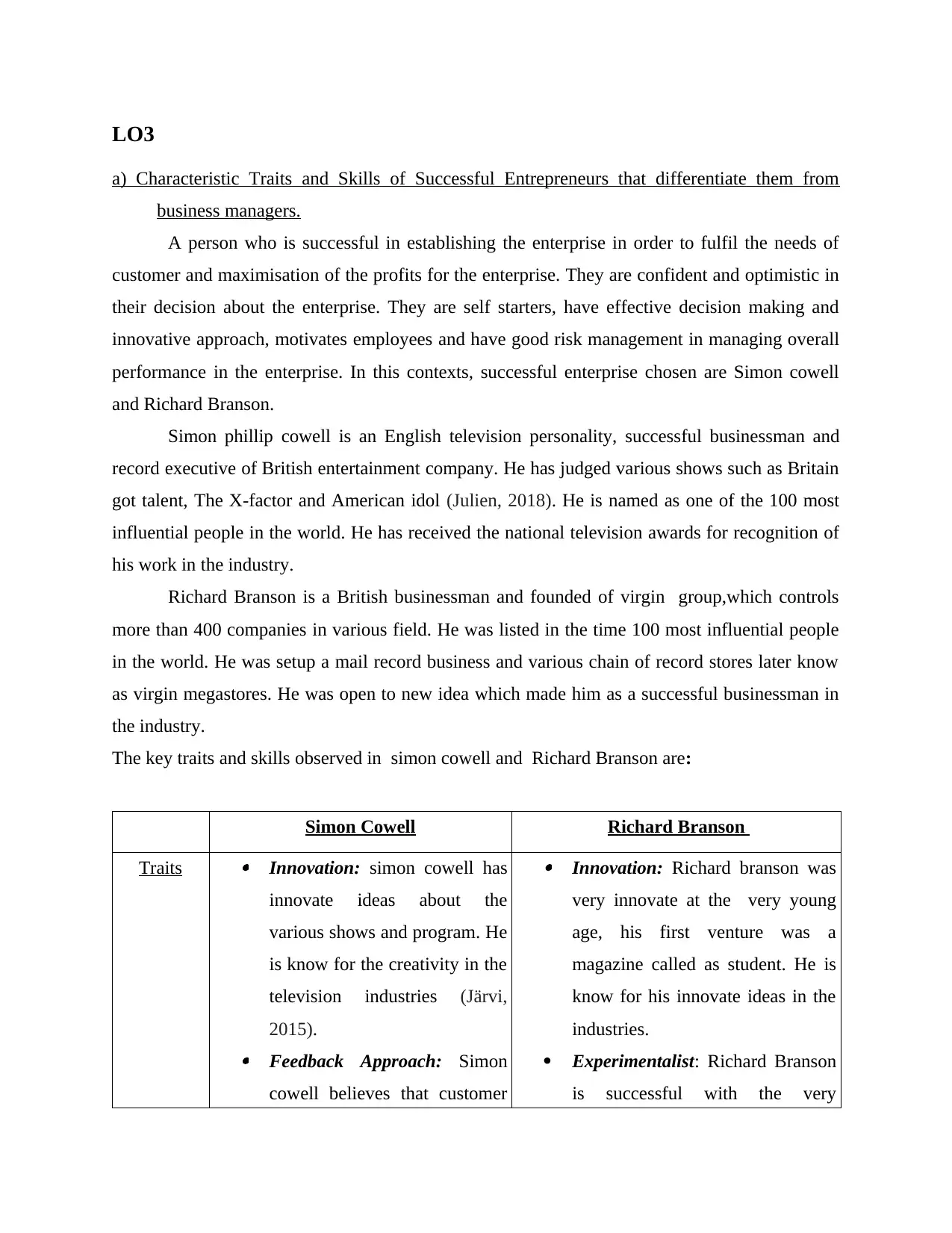
LO3
a) Characteristic Traits and Skills of Successful Entrepreneurs that differentiate them from
business managers.
A person who is successful in establishing the enterprise in order to fulfil the needs of
customer and maximisation of the profits for the enterprise. They are confident and optimistic in
their decision about the enterprise. They are self starters, have effective decision making and
innovative approach, motivates employees and have good risk management in managing overall
performance in the enterprise. In this contexts, successful enterprise chosen are Simon cowell
and Richard Branson.
Simon phillip cowell is an English television personality, successful businessman and
record executive of British entertainment company. He has judged various shows such as Britain
got talent, The X-factor and American idol (Julien, 2018). He is named as one of the 100 most
influential people in the world. He has received the national television awards for recognition of
his work in the industry.
Richard Branson is a British businessman and founded of virgin group,which controls
more than 400 companies in various field. He was listed in the time 100 most influential people
in the world. He was setup a mail record business and various chain of record stores later know
as virgin megastores. He was open to new idea which made him as a successful businessman in
the industry.
The key traits and skills observed in simon cowell and Richard Branson are:
Simon Cowell Richard Branson
Traits
Innovation: simon cowell has
innovate ideas about the
various shows and program. He
is know for the creativity in the
television industries (Järvi,
2015).
Feedback Approach: Simon
cowell believes that customer
Innovation: Richard branson was
very innovate at the very young
age, his first venture was a
magazine called as student. He is
know for his innovate ideas in the
industries.
Experimentalist: Richard Branson
is successful with the very
a) Characteristic Traits and Skills of Successful Entrepreneurs that differentiate them from
business managers.
A person who is successful in establishing the enterprise in order to fulfil the needs of
customer and maximisation of the profits for the enterprise. They are confident and optimistic in
their decision about the enterprise. They are self starters, have effective decision making and
innovative approach, motivates employees and have good risk management in managing overall
performance in the enterprise. In this contexts, successful enterprise chosen are Simon cowell
and Richard Branson.
Simon phillip cowell is an English television personality, successful businessman and
record executive of British entertainment company. He has judged various shows such as Britain
got talent, The X-factor and American idol (Julien, 2018). He is named as one of the 100 most
influential people in the world. He has received the national television awards for recognition of
his work in the industry.
Richard Branson is a British businessman and founded of virgin group,which controls
more than 400 companies in various field. He was listed in the time 100 most influential people
in the world. He was setup a mail record business and various chain of record stores later know
as virgin megastores. He was open to new idea which made him as a successful businessman in
the industry.
The key traits and skills observed in simon cowell and Richard Branson are:
Simon Cowell Richard Branson
Traits
Innovation: simon cowell has
innovate ideas about the
various shows and program. He
is know for the creativity in the
television industries (Järvi,
2015).
Feedback Approach: Simon
cowell believes that customer
Innovation: Richard branson was
very innovate at the very young
age, his first venture was a
magazine called as student. He is
know for his innovate ideas in the
industries.
Experimentalist: Richard Branson
is successful with the very
Paraphrase This Document
Need a fresh take? Get an instant paraphrase of this document with our AI Paraphraser

satisfaction is important
feedback in the market. To
improve the performance of the
industries.
experiment in the industries. He
always focus on experimenting
with new things.
2
feedback in the market. To
improve the performance of the
industries.
experiment in the industries. He
always focus on experimenting
with new things.
2
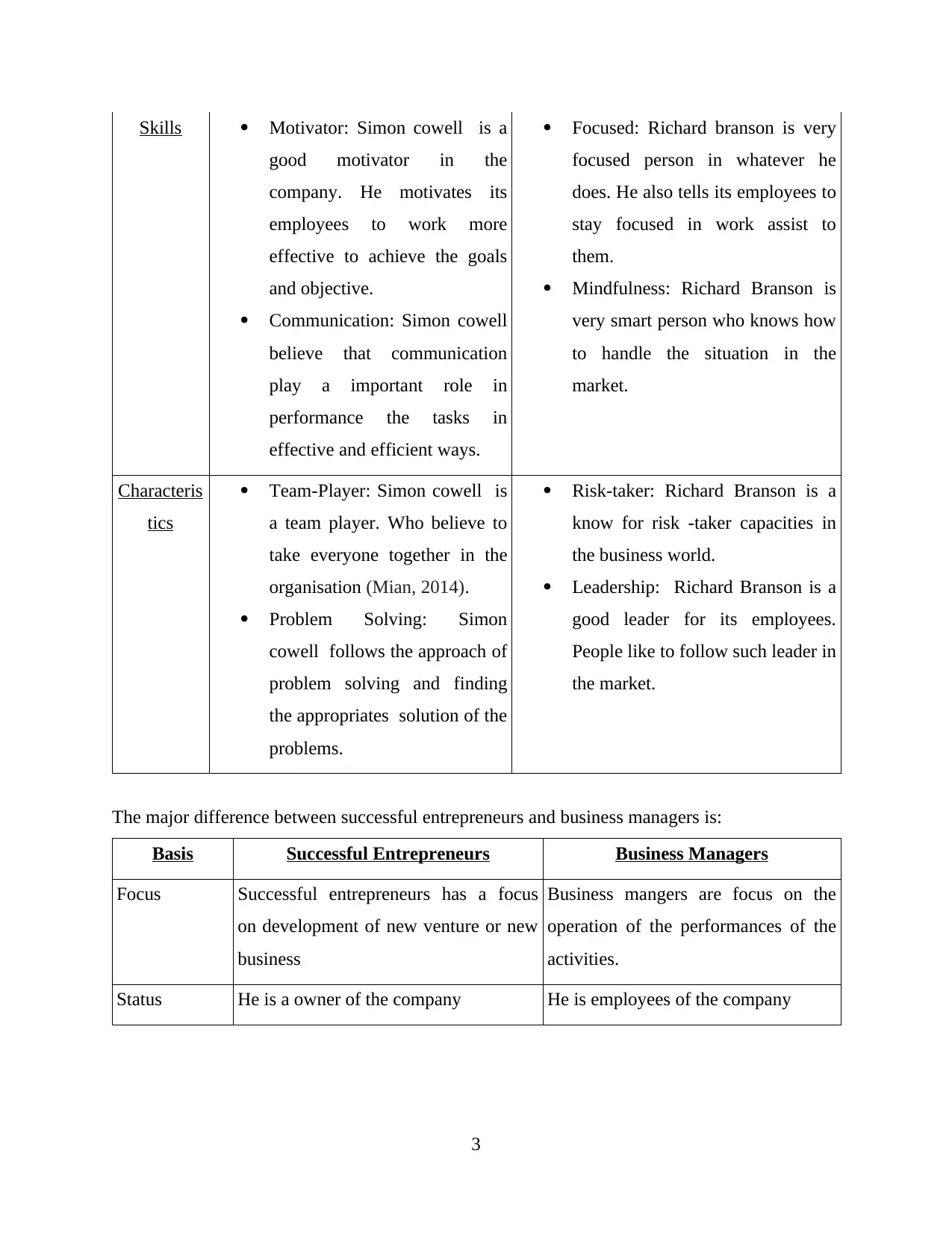
Skills Motivator: Simon cowell is a
good motivator in the
company. He motivates its
employees to work more
effective to achieve the goals
and objective.
Communication: Simon cowell
believe that communication
play a important role in
performance the tasks in
effective and efficient ways.
Focused: Richard branson is very
focused person in whatever he
does. He also tells its employees to
stay focused in work assist to
them.
Mindfulness: Richard Branson is
very smart person who knows how
to handle the situation in the
market.
Characteris
tics
Team-Player: Simon cowell is
a team player. Who believe to
take everyone together in the
organisation (Mian, 2014).
Problem Solving: Simon
cowell follows the approach of
problem solving and finding
the appropriates solution of the
problems.
Risk-taker: Richard Branson is a
know for risk -taker capacities in
the business world.
Leadership: Richard Branson is a
good leader for its employees.
People like to follow such leader in
the market.
The major difference between successful entrepreneurs and business managers is:
Basis Successful Entrepreneurs Business Managers
Focus Successful entrepreneurs has a focus
on development of new venture or new
business
Business mangers are focus on the
operation of the performances of the
activities.
Status He is a owner of the company He is employees of the company
3
good motivator in the
company. He motivates its
employees to work more
effective to achieve the goals
and objective.
Communication: Simon cowell
believe that communication
play a important role in
performance the tasks in
effective and efficient ways.
Focused: Richard branson is very
focused person in whatever he
does. He also tells its employees to
stay focused in work assist to
them.
Mindfulness: Richard Branson is
very smart person who knows how
to handle the situation in the
market.
Characteris
tics
Team-Player: Simon cowell is
a team player. Who believe to
take everyone together in the
organisation (Mian, 2014).
Problem Solving: Simon
cowell follows the approach of
problem solving and finding
the appropriates solution of the
problems.
Risk-taker: Richard Branson is a
know for risk -taker capacities in
the business world.
Leadership: Richard Branson is a
good leader for its employees.
People like to follow such leader in
the market.
The major difference between successful entrepreneurs and business managers is:
Basis Successful Entrepreneurs Business Managers
Focus Successful entrepreneurs has a focus
on development of new venture or new
business
Business mangers are focus on the
operation of the performances of the
activities.
Status He is a owner of the company He is employees of the company
3
⊘ This is a preview!⊘
Do you want full access?
Subscribe today to unlock all pages.

Trusted by 1+ million students worldwide
1 out of 17
Related Documents
Your All-in-One AI-Powered Toolkit for Academic Success.
+13062052269
info@desklib.com
Available 24*7 on WhatsApp / Email
![[object Object]](/_next/static/media/star-bottom.7253800d.svg)
Unlock your academic potential
Copyright © 2020–2026 A2Z Services. All Rights Reserved. Developed and managed by ZUCOL.




